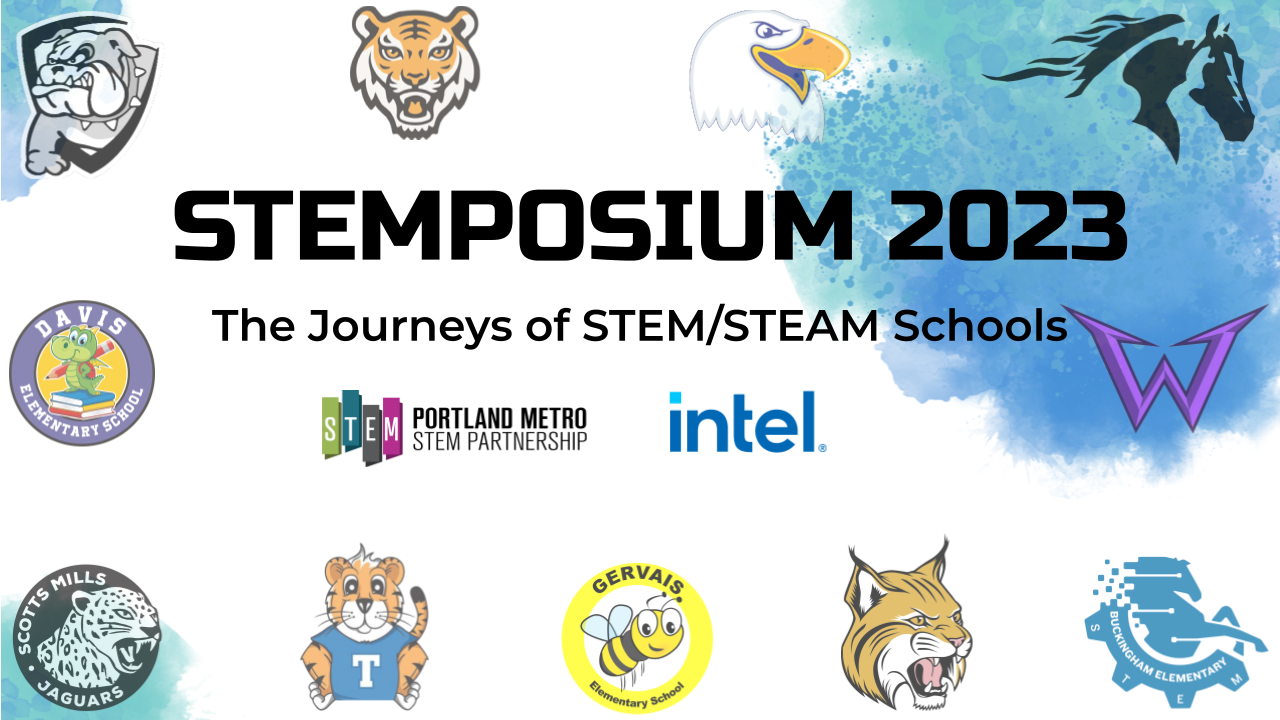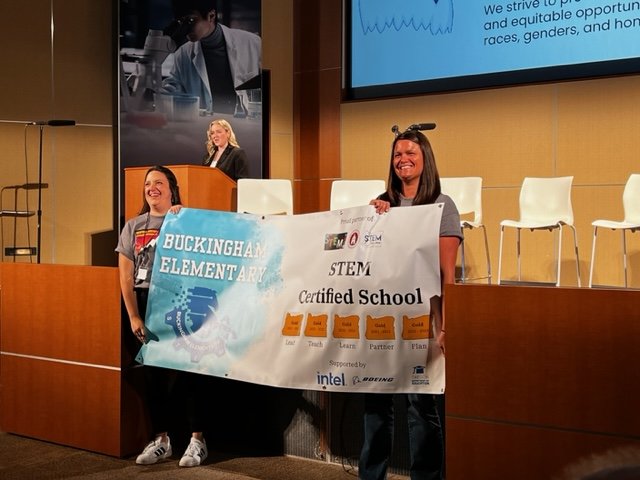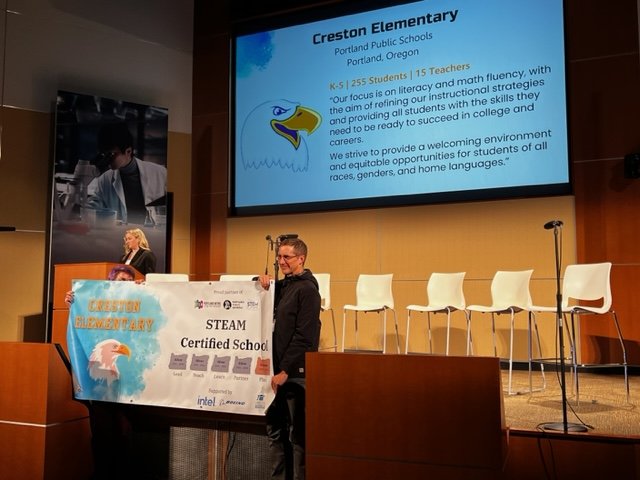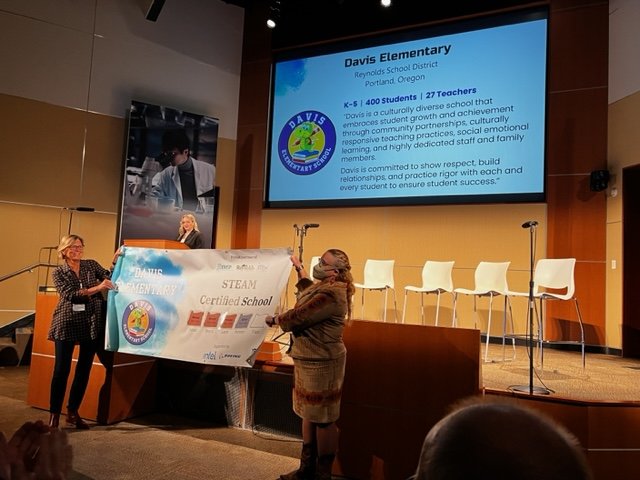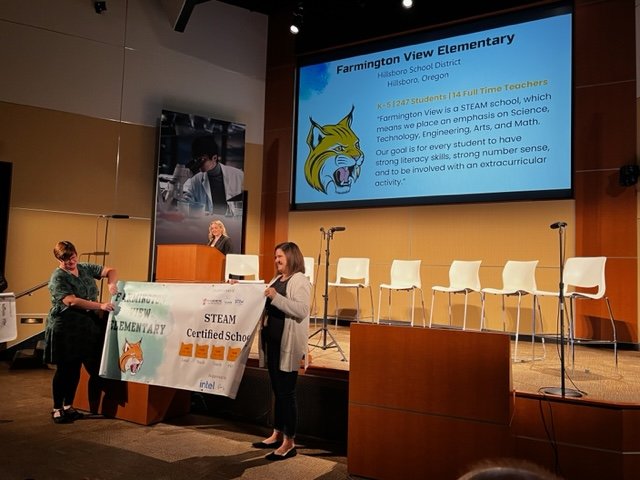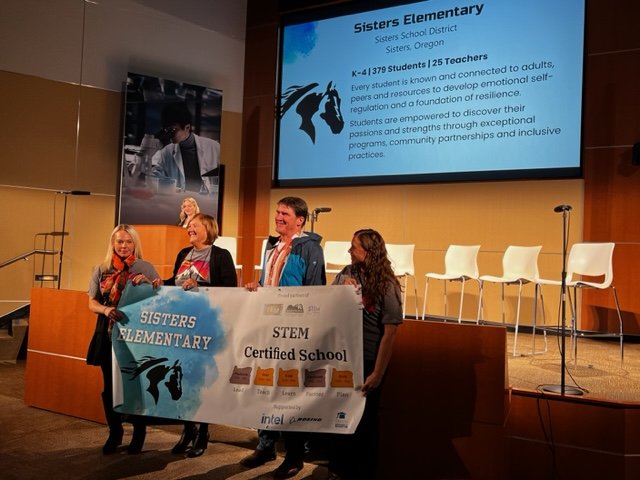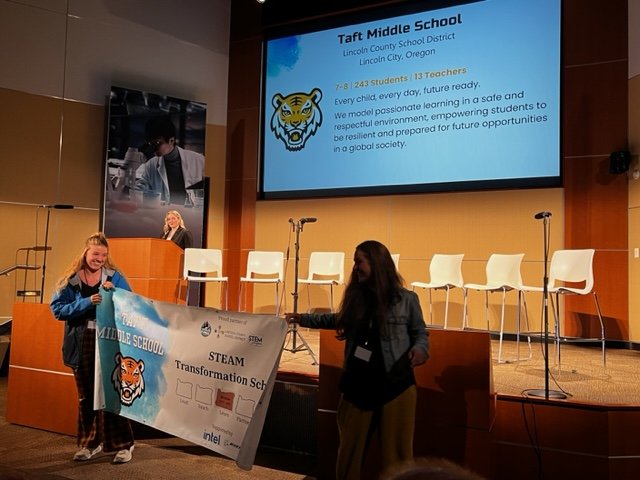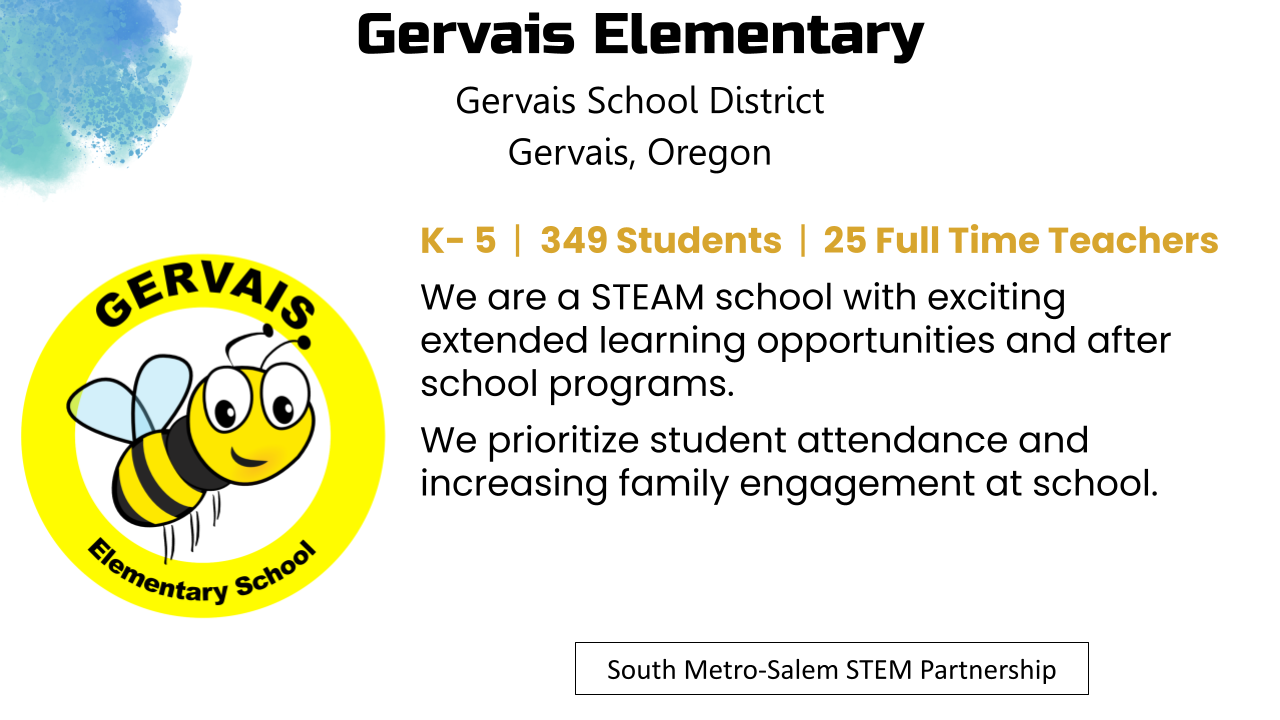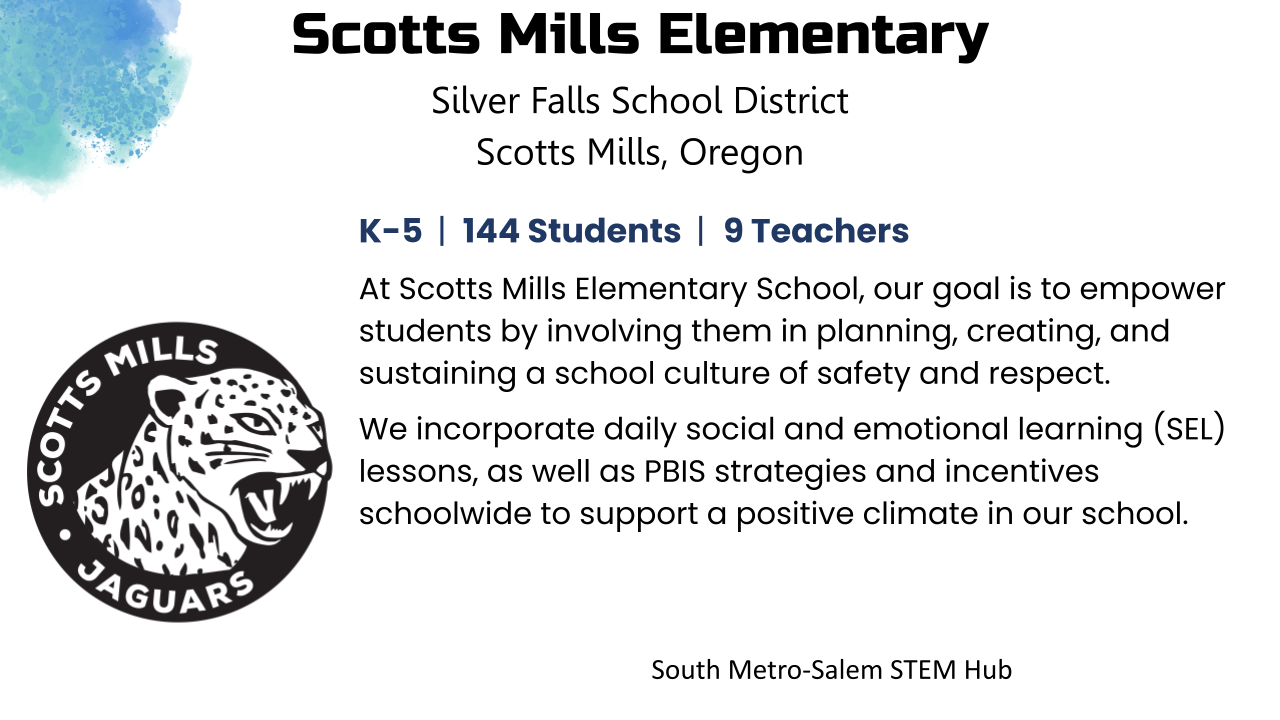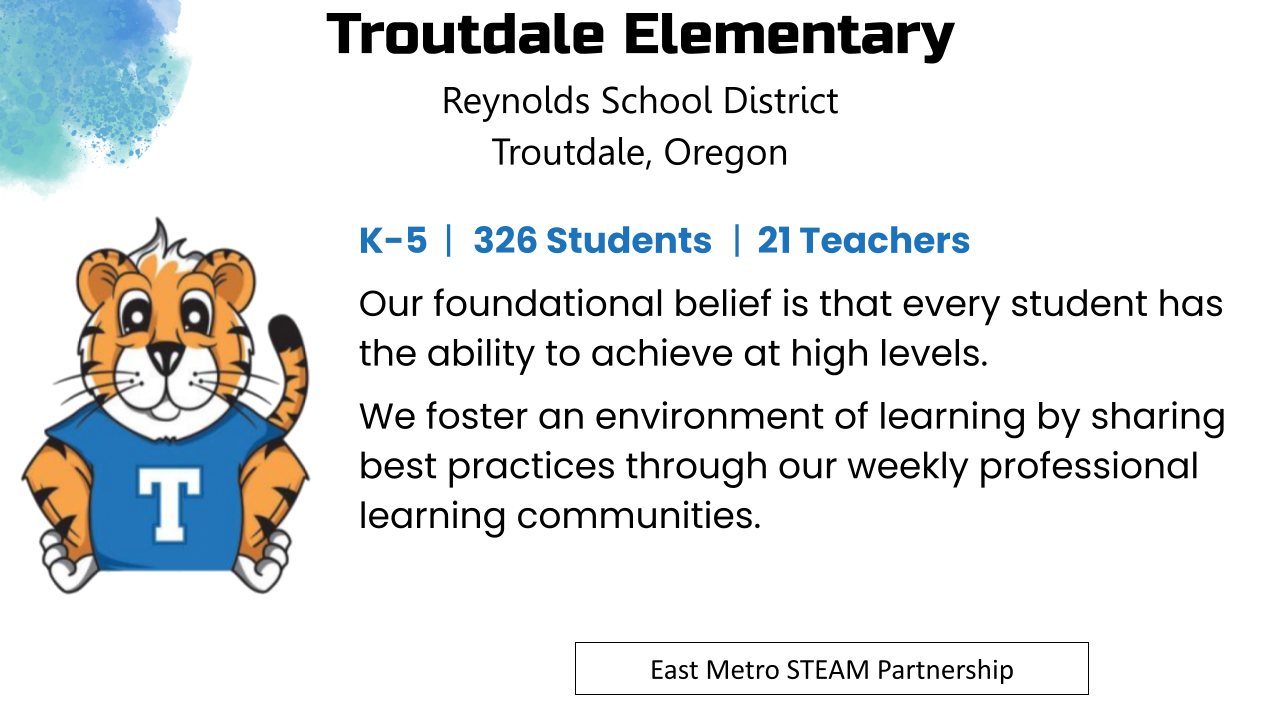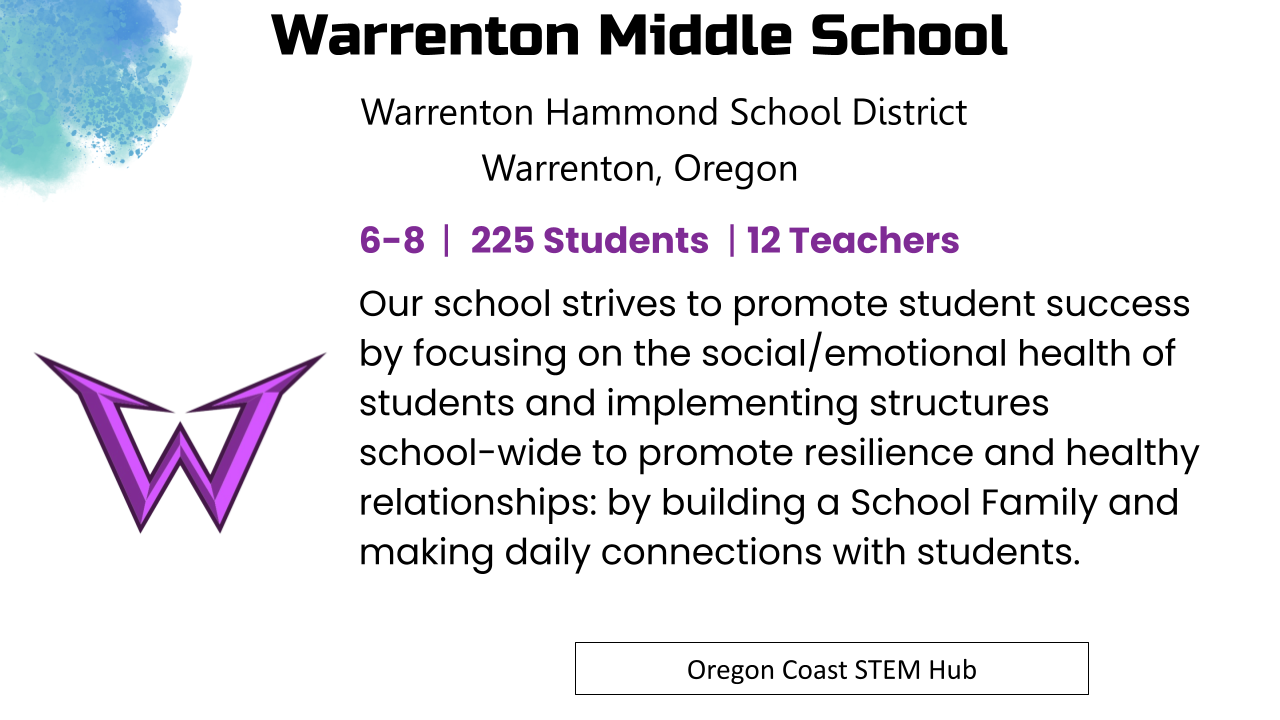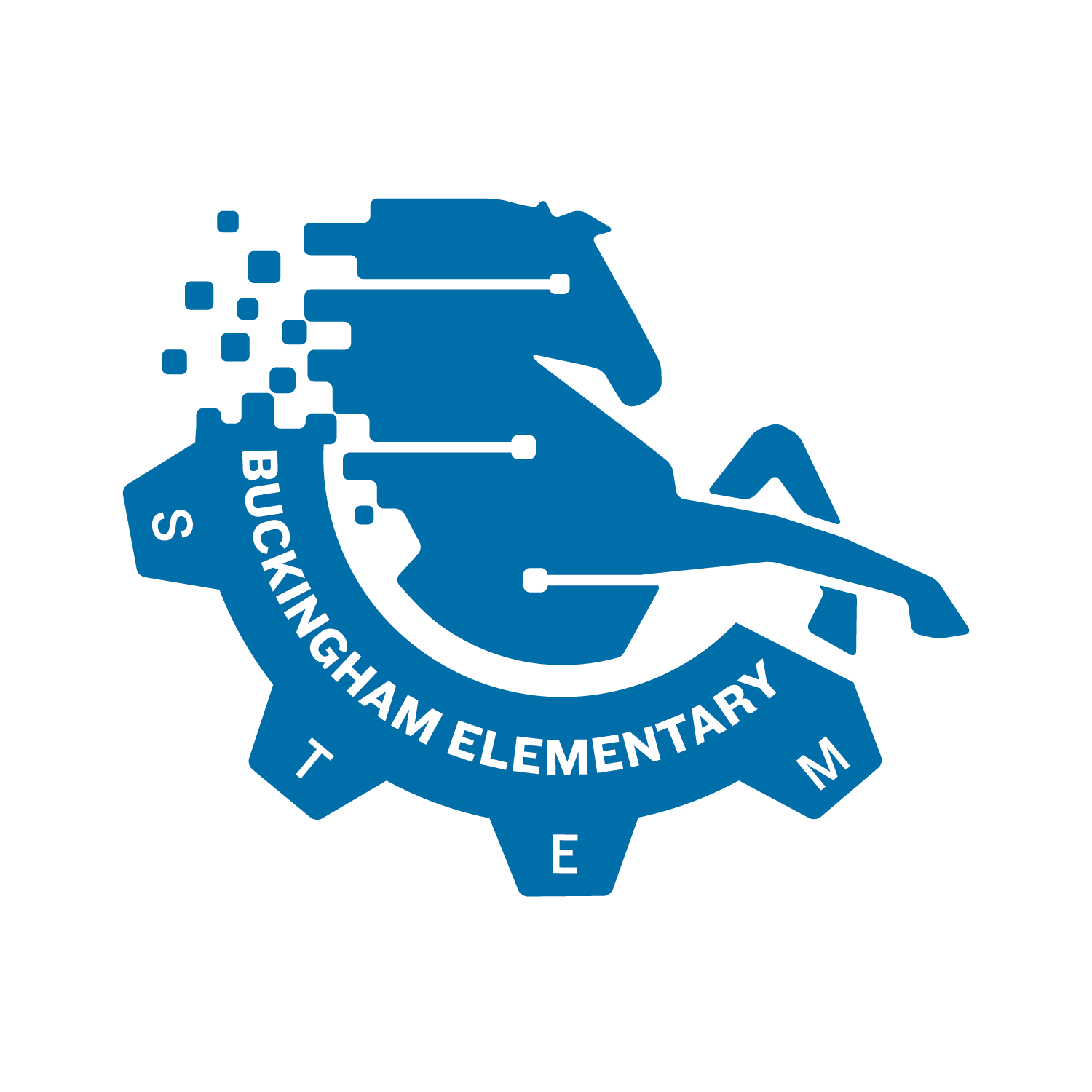The STEMposium returns to showcase the efforts of K-8 schools across the state to deepen their focus on STEM or STEAM! Each school embarks on a unique journey to engage staff, deepen their understanding of STEM/STEAM, and work together to improve outcomes for all students. Many schools are working to prepare our students for an ever-increasing global society dependent on understanding and using science, technology, engineering, and mathematics (STEM). One approach is to provide integrated STEM learning opportunities across the school and in conjunction with community partners. When schools also include the Arts and design, then STEM becomes STEAM.
Over the 2021-2023 Biennium, 11 schools from across the state of Oregon took on the challenge and commitment of joining the Statewide STEM Schools Project. This project was led by the Portland Metro STEM Partnership (PMSP) and five other Regional STEM Hubs joined the effort: East Metro STEM Partnership, South Metro STEM Partnership, Oregon Coast STEM Hub, Central Oregon STEM Hub, and Umpqua Valley STEAM Hub.
PMSP leaned into over a decade of research and experience to help develop a system of support that any school or community could choose to engage in. PMSP leaders joined with STEM education leaders from other regions to form the STEM Schools Leadership Team. Together, they prioritized development of a STEM School Rubric, Professional Learning Community cohort, transformation tools, Coaches Cadre, site visits, an application process, and a certification process for K-8 schools. The participating schools then engaged with the developed STEM Schools resources and tools to provide essential feedback to the Leadership Team, with a focus on making the resources more usable and accessible for schools. Thanks to their feedback and collaboration, we now have a system to support any K-8 school as well as a way to recognize schools seeking STEM certification.
We are proud to support schools wherever they are on their journeys. Some schools are just beginning the work. We call them STEM/STEAM Transformation Schools. They are at the beginning of their journeys and are dedicated to continuing to work with their community, educators, and students to create rich STEM experiences for the students in their schools. They do this by building partnerships, utilizing community assets, developing STEM identity in their students, supporting creativity, and encouraging teachers and students to try new things. This biennium PMSP, alongside their regional STEM Hub, supported:
Other schools have been working on STEM education for longer periods of time. This is the first group of schools to ever complete the Oregon STEM/STEAM Certification Process. This work included hours-long rubric reflection to develop a portfolio of evidence and hosting a school site visit. A STEM/STEAM Review committee conducted the site visit, talked with educators, observed classrooms to witness STEM teaching and learning, and reviewed their portfolio of evidence to determine their certification levels. STEM/STEAM Certified Schools performed anywhere from Bronze, Silver, Gold, and Platinum in five STEM Domains: Leadership (LEAD), Teaching (TEACH), Learning (LEARN), Partnership (PARTNER), and Planning (PLAN). This biennium PMSP, alongside their regional STEM Hub, supported the following now Certified STEM/STEAM Schools:
All of these schools are committed to the continual improvement process, as is PMSP and the K-8 STEM Schools Program. We celebrate where we are and how far these schools and the program have come. We also recognize that the system we have created is new and will benefit from further refinement. We look forward to partnerships that will allow the STEM Schools program to grow and improve in the coming years, with the end goal that Oregon students will have access to engaging and rigorous STEM learning experiences!
Role models and partnerships are critical to the success of these efforts. Since 2012, Intel has been a longtime partner and we had the privilege to have two speakers from Intel join the STEMposium.
Daniel De Leon is an AI Software Engineer who shared his journey, how his musical interests and mentors shaped his future, the “walls of fear” he faced and overcame, and the importance of representation, role models, and a supportive community. To learn more, check out the video Daniel and the Sea of Sound.
Selamawit Mehary is a Structural Project Engineer who shared her journey from Eritrea to Portland, the barriers she overcame, and the need for & importance of diversity in STEM. Throughout her journey, she was the only female person-of-color/black engineer.
“Intel is proud to have hosted Portland Metro STEM Partnership’s STEMposium this year to bridge industry and education and provide equitable pathways to STEM careers for students. Our local educators play a pivotal role in shaping the future workforce, and our partnership with PMSP helps to make that happen. Together, we are nurturing the innovators who will shape the future of our community and beyond.”
Architecture Foundation of Oregon connects practicing architects into classrooms across the state with their Architects in Schools program. Thank you for talking about your program and hosting a breakout session for educators!
Why STEM is Important
K-12 STEM education is critical in today’s highly globalized and technologically dependent world. STEM education provides educators the opportunity to develop lifelong learners who can adapt, learn, and stay up-to-date with new developments, which is increasingly important in today's fast-paced world. STEM education fosters critical thinking, problem-solving, and analytical skills. These skills are not only valuable in STEM careers but also in many other fields, as they encourage students to approach challenges with a logical and systematic mindset. STEM education helps students become scientifically literate community members. It empowers youth to make informed decisions about important issues, such as climate change, healthcare, and technology, by understanding the scientific principles and evidence behind them. STEM careers often offer competitive salaries and a wide range of job opportunities. By providing students with a solid STEM foundation, K-12 education can help them access these well-paying and rewarding career paths. And STEM occupations are growing faster than average!
According to the NSF Diversity in STEM report, women and certain race/ethnicity groups remain underrepresented in STEM occupations, which tend to have higher median salaries than non-STEM occupations (see figure 2-1 below).
The same report noted that people who work in STEM earn more than those in professions outside of STEM, regardless of sex, race, ethnicity, or disability status (see figure 4-1 below)
Special Thanks to:
With funding from ODE, Portland Metro STEM Partnership (PMSP) piloted a certification process for K-8 schools interested in becoming officially recognized as a STEM- or STEAM-focused school. PMSP led the effort with collaboration and support from Central Oregon STEM Hub, East Metro STEAM Partnership, Oregon Coast STEM Hub, South Metro-Salem STEM Hub, and Umpqua Valley STEAM Hub.
Sisters Elementary School & Buckingham Elementary School for sharing their 10+ year journey to become STEAM certified schools and how they partnered together to achieve their shared visions.
Brooke Nova, Assistant Superintendent at Hillsboro School District who spoke elegantly of the importance of STEAM Education and HSD’s efforts to ensure all students have access to high quality learning.
KATU Meteorologist and Multimedia Journalist Allison Gutleber served as emcee for the event and told her story of how she became a meteorologist.
PMSP is happy to support regional K-8 schools to improve outcomes in STEM/STEAM regardless of your interest (or not) to become certified!
What to learn more? Complete this form or contact jerian.abel@pdxstem.org

